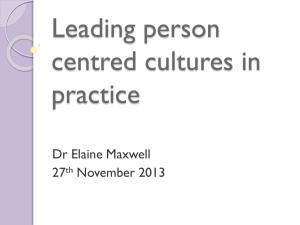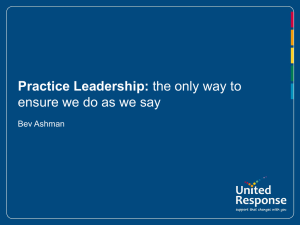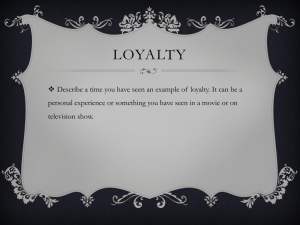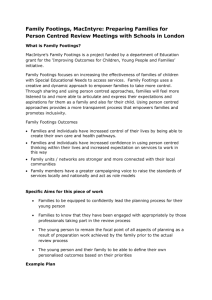PowerPoint Presentation - The BLUE Creative Idea
advertisement
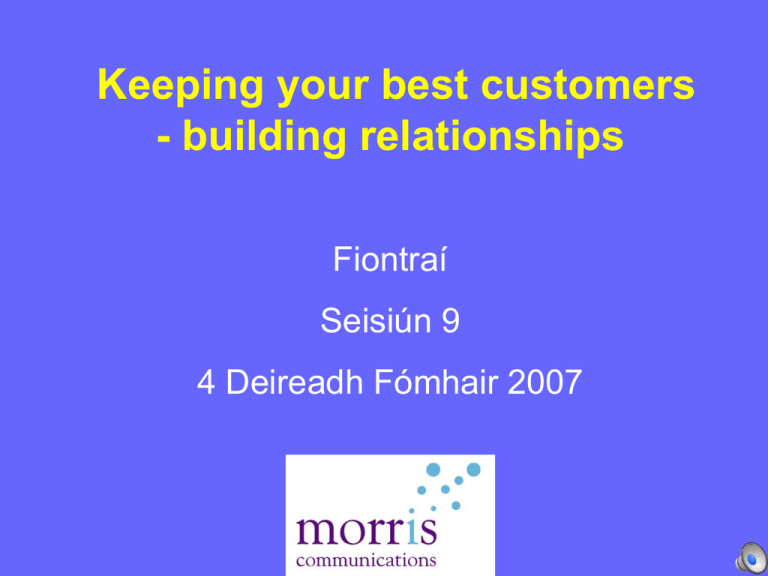
Keeping your best customers - building relationships Fiontraí Seisiún 9 4 Deireadh Fómhair 2007 Customer Care ‘Customers don’t care how much you know, until they know how much you care.’ David Maister Objective • Definition - customer care • Why is it important for any size of organisation? • Looking at ways to create a customer-centred culture Customer Care "Customer Service is a function of how well an organisation is able to constantly and consistently exceed the needs of the customer.” 2010 2000 1990 1980 1970 CUSTOMER SERVICE EXPECTATIONS The Facts • 6 times cheaper to retain a customer than it is to acquire a new one • Customers will tell 8 people about a good experience and 14 people about a bad one • 20% of your customer base will account for 80% of revenue • It costs less to get a second sale than you had to pay for the first one • Customer loyalty leads to profit Die Customers. Where do they go? 1% 3% 5% 9% 1% 3% 5% 9% 14% 14% 68% 68% Move Die away Move awayFriends Friends Influenced Influenced Product Product Quality Quality Poor ServicePoor Serv Building the relationship • Don’t count the people you reach, reach the people who count • Fish where the big fish are, put your efforts into proven techniques that work • Recognise previous customers • Turn every contact into an opportunity • Reward your best customers The Customer Value - The Pareto Principle Customer Value Top Customers High Potential Mainstream Customers Low Value Customers 80% of customers generate 20% of your revenue The Channels – Optimising the Mix One to One Top Customers High Potential Mainstream Customers Low Value Customers One Way Differential Marketing • All consumers are not created equal • All purchases are not equal • All consumers should not be treated equally • Know your customers Be strategic about identifying customers Managing Customers High Prisoners Happy marriages Stranger s Distant lovers Behavioural Loyalty Low High Emotional Loyalty “Loyalty cannot be bought. You must earn it.” Creating a customer centred culture The 5 Cs 1. 2. 3. 4. 5. Communications Consistency Courtesy Change Care Creating a customer centred culture The 5 Cs 1. Communications - listening, feedback – Never over promise (realistic deadlines) – No surprises – Keep customer informed – Know them (without being intrusive) – Thanks Creating a customer centred culture The 5 Cs 1. Communications • Staff, hire, brief, reward • Listen to customer needs/add value • Maintain a relevant dialogue • Ensure all your staff have a clear understanding of customer service Creating a customer centred culture The 5 Cs 2. Consistency – Incentives – Climate/culture – Quality Controls – Brief staff – Quality Control and measurement Creating a customer centred culture 3. Courtesy • Eye contact • Returning phone calls • Pleasant manner • Respect for privacy • Emotional Intelligence Creating a customer centred culture 4. Change • Feedback • Acting on it • Listen to needs • Add value Creating a customer centred culture 5. Care • Showing that you care • Be open and accessible • Value the relationship • Reward loyalty Creating a customer centred culture The 5 Cs 1. Communications - listening, feedback, asking,dealing with problems 2. Consistency - be consistent as possible 3. Courtesy- eye contact, returning phone calls, pleasant manner, respect for privacy Creating a customer centred culture The 5 Cs 4. Change - asking for feedback or receiving it and doing something 5. Care - showing that you care and value the relationship “Complaints should be seen as an opportunity” Complaint Myths • If customers don’t complain we are performing satisfactorily 96% of people do not complain directly to companies – but they do complain to others and 9 out of 10 of these customers will never come back. • If a company deals with the complaint they will still not come back Normally, a satisfactory resolution to a problem generates loyalty. If you can resolve a complaint on the spot 95% of customers remain loyal. • People enjoy complaining This is untrue. It is costly and inconvenient. How to Handle Complaints Listen Actively Remember Never................. Apologise Say Calm Down Empathise Make Excuses Ask Questions Make promises you cannot keep Analyse and Decide Do what you have promised Stop it happening again! Explain why this is always happening Become angry or aggressive yourself How to Handle Complaints Never ruin an apology with an excuse Being customer centered is important to the future success of any size of organisation by creating profitability, generating goodwill and being flexible to change. “The customer is King, keep them coming back.." -- Fergal Quinn Superquinn. Golden Rules for Customer Care • It costs more to gain a new customer than to retain an existing one • Dissatisfied customers have more friends than satisfied ones • Unless you deal with a customer to their satisfaction you will lose a customer forever • You must listen to your customers to find out what they want • The customer that is complaining is not one of many, but one of one. • The customer has a choice Golden Rules for Customer Care • If you don’t look after your customer, someone else will • Customer loyalty is only as good as the last transaction • Welcome complaints – they allow for recovery • If you don’t believe how can you expect the customer to? • Treat suppliers as you would customers • Customer Care is not a spectator sport “Care more than others- think wise. Risk more than others - think safe. Dream more than others - think practical. Expect more than others - think possible.” Howard Shultz, CEO Starbucks Coffee Thank you and Good Luck!

